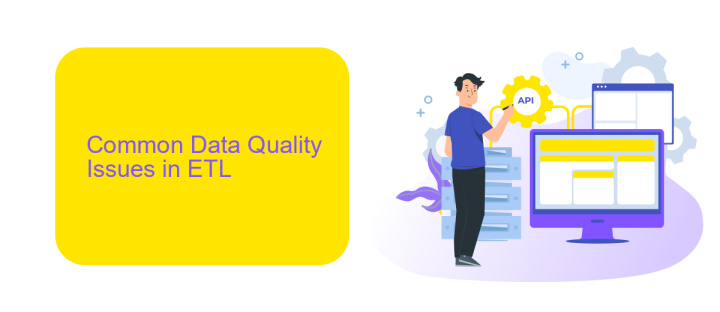ETL Data Quality
Ensuring data quality in ETL (Extract, Transform, Load) processes is crucial for reliable and accurate data analysis. Poor data quality can lead to incorrect insights and business decisions. This article explores the key aspects of maintaining high data quality throughout ETL processes, including best practices, common challenges, and effective strategies to ensure data integrity and consistency.
Introduction to ETL Data Quality
ETL (Extract, Transform, Load) processes are fundamental to data integration and management, ensuring that data is accurately and efficiently transferred from source systems to data warehouses or other storage solutions. Data quality is a critical aspect of ETL, as poor data quality can lead to inaccurate analytics and business decisions.
- Data Consistency: Ensuring uniformity across datasets.
- Data Accuracy: Verifying the correctness of data.
- Data Completeness: Ensuring no missing values.
- Data Timeliness: Data should be up-to-date.
- Data Integrity: Maintaining data accuracy and consistency over its lifecycle.
One of the tools that can help streamline ETL processes and ensure high data quality is ApiX-Drive. This service allows for easy integration of various data sources, automating data extraction, transformation, and loading. By using ApiX-Drive, businesses can enhance their data quality management, reduce manual errors, and ensure that their data is reliable and actionable.
Common Data Quality Issues in ETL

One of the most common data quality issues in ETL processes is data inconsistency. This occurs when data from various sources do not match or align correctly, leading to inaccuracies and unreliable insights. Inconsistent data can arise due to differences in data formats, naming conventions, or data entry errors. Ensuring consistent data requires rigorous validation and transformation processes to standardize data before loading it into the target system.
Another prevalent issue is data duplication, where the same data appears multiple times within the dataset, skewing analysis and reporting. Duplicates can occur due to multiple data sources or repeated data entries. Implementing deduplication techniques and using integration services like ApiX-Drive can help mitigate this problem by automating data synchronization and ensuring that only unique, high-quality data is transferred. Regular audits and data cleansing activities are also essential to maintain data integrity and reliability.
Data Cleansing and Transformation Techniques

Data cleansing and transformation are crucial steps in ensuring the quality of data in ETL processes. These techniques help in identifying and correcting errors, inconsistencies, and inaccuracies in the data, thereby enhancing its reliability and usability.
- Data Cleansing: This involves detecting and correcting errors in the data. Common techniques include removing duplicates, handling missing values, and correcting data types.
- Data Transformation: This process converts data into a suitable format for analysis. Techniques include normalization, aggregation, and data integration. Tools like ApiX-Drive can automate data integration, ensuring seamless and accurate data flow between different systems.
- Validation: This step ensures that the data meets predefined standards and rules. It includes range checks, pattern matching, and consistency checks.
Implementing robust data cleansing and transformation techniques is essential for maintaining high data quality. Leveraging tools like ApiX-Drive can streamline these processes, making it easier to manage and integrate data from various sources effectively.
Data Quality Assessment and Monitoring

Ensuring data quality in ETL processes is crucial for maintaining the integrity and reliability of data. Data quality assessment and monitoring involve evaluating the data for accuracy, completeness, consistency, and timeliness. This helps in identifying any discrepancies or errors that may affect decision-making processes.
To effectively monitor data quality, organizations need to implement automated tools and processes. Regular audits and validation checks are essential to ensure that data remains accurate and up-to-date. These practices help in detecting and resolving issues before they escalate, thereby maintaining the overall health of the data ecosystem.
- Implement automated data validation tools.
- Conduct regular data quality audits.
- Set up real-time monitoring systems.
- Utilize integration services like ApiX-Drive for seamless data flow.
By leveraging services like ApiX-Drive, organizations can streamline their data integration processes, ensuring that data from various sources is consistently checked and validated. This not only enhances data quality but also improves the efficiency of ETL operations, leading to more reliable and actionable insights.
Best Practices for ETL Data Quality
Ensuring high data quality in ETL processes is crucial for accurate analytics and decision-making. One of the best practices includes implementing comprehensive data validation checks at each stage of the ETL process. This involves checking for data completeness, consistency, and accuracy before data is transformed and loaded into the target system. Automating these checks can significantly reduce errors and improve efficiency.
Another essential practice is to establish robust monitoring and alerting mechanisms to detect and address data quality issues in real-time. Utilizing integration services like ApiX-Drive can streamline this process by automating data flows between various sources and destinations, ensuring data consistency and reducing manual intervention. Regularly reviewing and updating ETL processes to adapt to changing data sources and business requirements is also vital for maintaining high data quality over time.
FAQ
What is ETL Data Quality?
Why is ETL Data Quality important?
What are common ETL Data Quality issues?
How can ETL Data Quality be automated?
What are best practices for maintaining ETL Data Quality?
Apix-Drive will help optimize business processes, save you from a lot of routine tasks and unnecessary costs for automation, attracting additional specialists. Try setting up a free test connection with ApiX-Drive and see for yourself. Now you have to think about where to invest the freed time and money!

